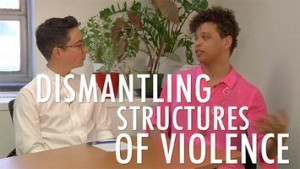No One is Disposable: Dean Spade, Reina Gossett and CeCe McDonald Discuss Prison Abolition
By Roges Ahnet
No One Is Disposable: Everyday Acts of Prison Abolition highlights the importance of utilizing a prison abolitionist framework to confront and dismantle state and interpersonal violence. In the initial installment of the series, activist and prison abolitionists Dean Spade and Reina Gossett define prison abolition as a set of four principles: prevention of harm, intervening in harm, reparations because of harm, and transformative justice for communities as part of movement work for the elimination of harm. The series challenges viewers to incorporate acts of abolition into their daily lives, offering support to incarcerated people and the issues they face inside and outside America’s vast prison system.
Dean Spade and Reina Gossett positions prison abolition at the intersection of trans* and queer activism; the prison industrial complex reinforces coercive binaries and the resistance and abolition of these systems plays a large role in the support of trans* and queer people. People of color, people with disabilities, undocumented people, poor people, and queer and trans* people fill prison cells. This system, which imagines some people as violent and undesirable, erases the systemic realities of colonialism, capitalism, racism, and sexism.
In No One Is Disposable, Dean Spade and Reina Gossett envision communities that embrace accountability and transformative and restorative justice. Building on the work of Mumia Abu-Jamal and Angela Y. Davis who, in “Alternatives to the Present System of Capitalist Injustice,” discuss goals of restorative justice in a world without prisons, focusing on root problems. Here, Spade and Gossett spotlight the intersecting and interconnected oppression of violence, moving the conversation beyond reform for a system that is geared towards the oppression of people and perpetuations of violence.
Their intervention is especially powerful given the ways that media advances a pro-incarceration platform. In similar regards, Laverne Cox has created a role outside of Orange Is The New Black, a platform  that supports CeCe McDonald on her prison abolition and trans* advocacy. Shows such as these dramatize the lives of incarcerated people, spotlighting their humanity. Yet, the visibility of prisons within popular media has not yet led to voice from those who are incarcerated, enduring the daily violence resulting from America’s vast prison system.
that supports CeCe McDonald on her prison abolition and trans* advocacy. Shows such as these dramatize the lives of incarcerated people, spotlighting their humanity. Yet, the visibility of prisons within popular media has not yet led to voice from those who are incarcerated, enduring the daily violence resulting from America’s vast prison system.
Embracing a black feminist nonviolence strategy, No One Is Disposable offers the language for understanding intersectionality, all while empowering viewers with the tools necessary for accountability and praxis. This work is part of a larger effort that focuses on transformation and collective change. For example, Creative Interventions, a feminist of color organization, has developed a toolkit that promote methods to dismantle interpersonal violence in community. This toolkit offers ways to support people who have been harmed by violence and how to hold people and institutions accountable for perpetuations of violence. Spade and Gossett call upon communities to resist disposability and exile, where people’s experiences with state and interpersonal violence are not the norm, and everyone has the ability to engage with transformative justice.
Yet their work also embraces more radical goals. Prison abolition is about putting an end to all systems of violence, prioritizing the dismantling of the prison industrial complex. Noting the difference between prison reform and prison abolition is critical. Prison reform aims to make the conditions of prisons more suitable for incarcerated people. The utility of prisons remains unchecked. Whereas prison abolition imagines and works toward a world without prisons while creating community based in accountability.
Reina Gossett articulates how to balance the support of incarcerated people’s needs while remaining focused around prison abolition. The goal is to see an end to a prison nation, to see the release of people from prisons; yet the focus has to be short-term as well, providing support for imprisoned people and demanding changes that accounts for despair and violence experienced those incarcerated. Prison abolition demands an end to mass incarceration while accounting for the systemic silencing of incarcerated people, centering the voices of incarcerated people and offering support for their health, ambitions, and dreams.
Here Gossett “makes it plain” when she notes, “The number one predator, I feel like, for our community are the police.” Dean Spade and Reina Gossett push the conversation about prisons, reflecting on state and systematic violence. The military, police, and border guards are all part of a system that continues to incarcerate and kill people of color, undocumented people, poor people, trans* people, and people with disabilities. Drawing on the work of Ruthie Gilmore, No One is Innocent addresses common question prison abolitionists are asked, such as “What about the dangerous people?” Reina Gossett says, “The logic of the state demands a dichotomy of innocent and guilty so imprisonment and deportation can be justified.”
In another installment, What About Dangerous People, Spade and Gossett address how mass incarceration necessitates a world of dangerous people to rationalize its continued expansion. Rooted in slavery, capitalism, constructions of disability, and notions of gender deviance, the state creates “dangerous people,” with solutions based in incarceration and targets of violence. As a system based in profit, the construction of prisons requires an effort to fill them; people of color, the poor, GLBTQ people, and many others are seen as undesirable and dangerous. They are criminalized and thus pushed into prisons. Prison themselves create more violence; they do not ensure survivor needs or the transformation of people who have caused harm.
One example of a prison abolitionist mindset offered is resistance to police interference; strategizing ways to intervene in violence is noted as making caring moves for community to prevent harm. Accountability to people who experience different oppressions ensures that the voices of people who experience disproportionate violence to be heard. Holding oneself accountable for perpetuations of violence can lead to transformation as can reaching out to community and organizing together to take action against prisons.
 With “I use My love to Guide Me:” Surviving and Thriving In the Face of Impossible Situations, the series also offers a conversation with CeCe McDonald, trans advocate and activist, who was recently released from prison after being arrested and incarcerated for stabbing an attacker in self-defense of transphobic and racist violence. McDonald bravely shares her story, while emphasizing the importance of building up community and utilizing the tools and resources available to move away from enabling police interference and prisons; she speaks radically about self-love and forgiveness, for herself and others. CeCe McDonald pronounces, “I use my love to guide me through my fears.” Yet CeCe doesn’t stop there; she adamantly has the message that prisons aren’t safe for anyone and everyone needs to embrace a prison abolitionist framework, including youth. Hearing CeCe speak about her experience with incarceration and thoughts around prison abolition is inspirational and motivational.
With “I use My love to Guide Me:” Surviving and Thriving In the Face of Impossible Situations, the series also offers a conversation with CeCe McDonald, trans advocate and activist, who was recently released from prison after being arrested and incarcerated for stabbing an attacker in self-defense of transphobic and racist violence. McDonald bravely shares her story, while emphasizing the importance of building up community and utilizing the tools and resources available to move away from enabling police interference and prisons; she speaks radically about self-love and forgiveness, for herself and others. CeCe McDonald pronounces, “I use my love to guide me through my fears.” Yet CeCe doesn’t stop there; she adamantly has the message that prisons aren’t safe for anyone and everyone needs to embrace a prison abolitionist framework, including youth. Hearing CeCe speak about her experience with incarceration and thoughts around prison abolition is inspirational and motivational.
Dean Spade, Reina Gossett, and CeCe McDonald challenge viewers to dismantle oppressive systems and embrace a prison abolitionist framework for transformative justice and strategies to prevent and intervene in harm. These activists provoke the sentiments of prison abolition throughout the last decades and expand with centering trans* and queer resistance to the prison industrial complex. Together, No One is Disposable: Everyday Acts of Prison Abolition and “I use My love to Guide Me:” Surviving and Thriving In the Face of Impossible Situations offer a series of real, personal, and enlightening material that demands action against interrelated oppressions toward the collective goal of prison abolition. Reforms and efforts focused on producing more laws are insufficient. The messages here are clear: these systems are not safe, they do not prevent or intervene in harm, they provide no source of transformative justice, and they are only used to fulfill quotas of the criminalization of oppressed people.
Accountability is a lifelong process; it is both personal reflection and action. It is a space that accounts for privileges and demands the self to be in check from moments alone or in spaces devoted to justice and all of the situations one can exist in, interpersonally or organizational. Accountability leaves room to receive critique and space for transformation; it relinquishes ideas that we know about oppression we do not experience. Others can demand accountability, but it is truly up to us to apply it to all parts of our lives. No One Is Disposable challenges viewers to be accountable and to reflect on complicity, while it also empowers with language and knowledge to convert theory into practice.
*Not only did Barnard Center Research of Women produce the series No One is Disposable, they complied a useful resource list to help expand people’s knowledge of prison abolition. http://bcrw.barnard.edu/blog/no-one-is-disposable-resources-and-context-for-a-conversation-on-prison-abolition/ (No One Is Disposable: Resources and Context for A Conversation On Prison Abolition)
Video Links:
No One Is Disposable: Everyday Acts of Prison Abolition
“I Use My Love To Guide Me”: Surviving and Thriving In The Face of Impossible Situations
_______________________________________________________________
 Roges Ahnet supports harm reduction, prison abolition, and practices of accountability and healing
Roges Ahnet supports harm reduction, prison abolition, and practices of accountability and healing




0 comments